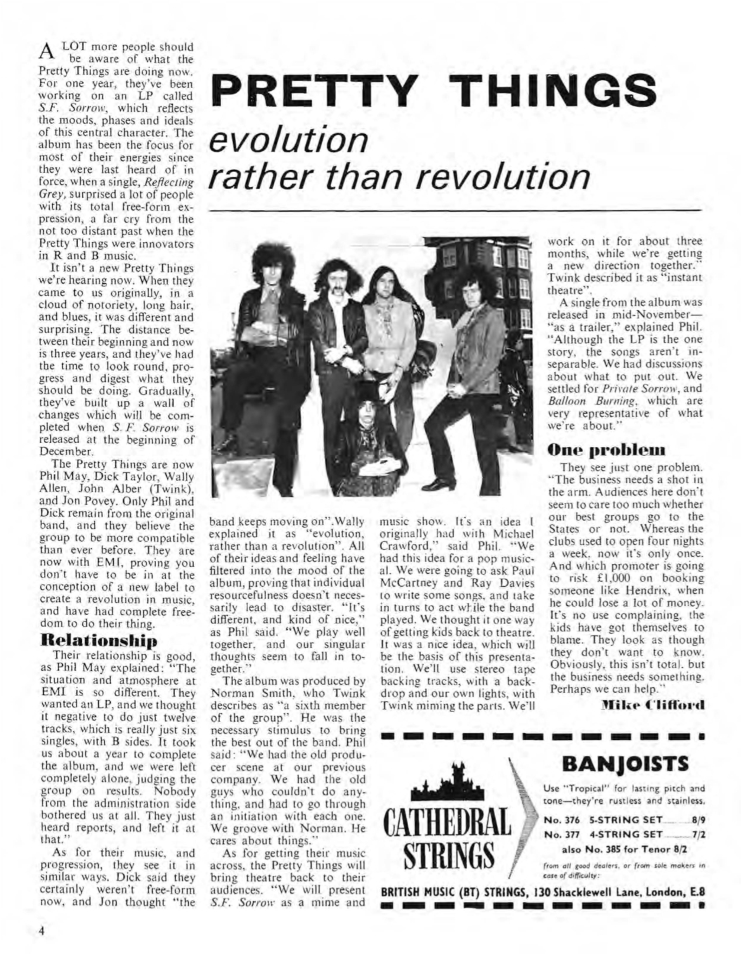Cet article de Mike Clifford est paru dans le numéro 68 du mensuel britannique Beat Instrumental, daté de décembre 1968.

Transcription
A LOT more people should be aware of what the Pretty Things are doing now. For one year, they’ve been working on an LP called S.F. Sorrow, which reflects the moods, phases and ideals of this central character. The album has been the focus for most of their energies since they were last heard of in force, when a single, Reflecting Grey,(sic) surprised a lot of people with its total free-form expression, a far cry from the not too distant past when the Pretty Things were innovators in R and B music.
It isn’t a new Pretty Things we’re hearing now. When they came to us originally, in a cloud of notoriety, long hair, and blues, it was different and surprising. The distance between their beginning and now is three years, and they’ve had the time to look round, progress and digest what they should be doing. Gradually, they’ve built up a wall of changes which will be completed when S. F. Sorrow is released at the beginning of December.
The Pretty Things are now Phil May, Dick Taylor, Wally Allen, John Alber (Twink), and Jon Povey. Only Phil and Dick remain from the original band, and they believe the group to be more compatible than ever before. They are now with EMI, proving you don’t have to be in at the conception of a new label to create a revolution in music and have had complete freedom to do their thing.
Their relationship is good, as PhIl May explained: “The situation and atmosphere at EMI is so different. They wanted an LP, and we thought it negative to do just twelve tracks, which is really just six singles, with B sides. It took us about a year to complete the album, and we were left completely alone, judging the group on results. Nobody from the administration side bothered us at all. They just heard reports, and left it at that.”
As for their music, and progression, they see it in similar ways. Dick said they certainly weren’t free-form now, and Jon thought “the band keeps moving on.” Wally explained it as “evolution, rather than a revolution.” All of their ideas and feeling have filtered into the mood of the album, proving that individual resourcefulness doesn’t necessarily lead to disaster. “It’s different, and kind of nice,” as Phil said. “We play well together, and our singular thoughts seem to fall in together.”
The album was produced by Norman Smith, who Twink describes as “a sixth member of the group.” He was the necessary stimulus to bring the best out of the band. Phil said: “We had the old producer scene at our previous company. We had the old guys who couldn’t do anything, and had to go through an initiation with each one. We groove with Norman. He cares about things.”
As for getting their music across, the Pretty Things will bring theatre back to their audiences. “We will present S. F. Sorrow as a mime and music show. It’s an idea I originally had with Michael Crawford,” said Phil. “We had this idea for a pop musical. We were going to ask Paul McCartney and Ray Davies to write some songs, and take in turns to act while the band played. We thought it one way of getting kids back to theatre. It was a nice idea, which will be the basis of this presentation. We’ll use stereo tape backing tracks, with a backdrop and our own lights, with Twink miming the parts. We’ll work on it for about three months, while we’re getting a new direction together.” Twink described it as “instant theatre.”
A single from the album was released in mid-November—“as a trailer,” explained Phil. “Although the LP is the one story, the songs aren’t inseparable. We had discussions about what to put out. We settled for Private Sorrow, and Balloon Burning, which are very representative of what we’re about.”
They see just one problem. “The business needs a shot in the arm. Audiences here don’t seem to care too much whether our best groups go to the States or not. Whereas the clubs used to open four nights a week, now it’s only once. And which promoter is going to risk £1,000 on booking someone like Hendrix, when he could lose a lot of money. It’s no use complaining, the kids have got themselves to blame. They look as though they don’t want to know. Obviously, this isn’t total, but the business needs something. Perhaps we can help.”
Source : WorldRadioHistory.com (PDF).